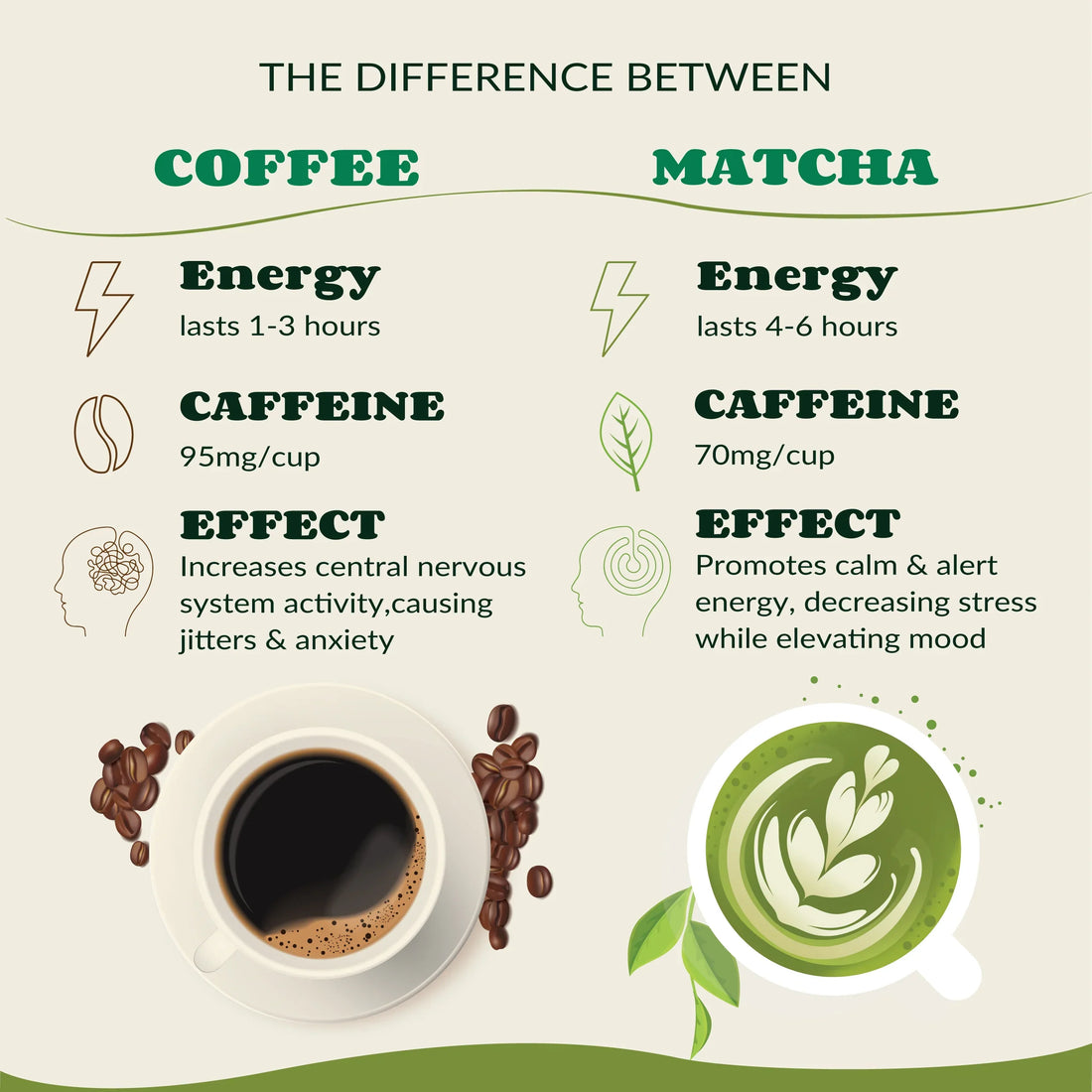Yes, matcha does contain caffeine. However, the caffeine content in matcha differs from other caffeinated beverages like coffee or traditional brewed tea. Here's a breakdown of how matcha compares:

How Much Caffeine is in Your Matcha
- 1 gram of matcha (about half a teaspoon) contains approximately 19 to 44 mg of caffeine.
- A standard serving size (1 teaspoon or about 2 grams) of matcha typically contains 38 to 88 mg of caffeine, depending on the quality and how it's prepared.
This is less than a typical cup of coffee, which contains around 95 mg of caffeine, but more than most brewed teas.
A Comprehensive Guide to Caffeinated Drinks and Their Effects On People's Health
How Long Does Caffeine Stay in Your System?
How Caffeine in Matcha Differs
The caffeine in matcha is absorbed more slowly compared to coffee. This slower absorption is due to the presence of L-theanine, an amino acid found in tea leaves, including matcha. L-theanine promotes relaxation and works synergistically with caffeine, leading to:
- Sustained energy over several hours.
- Reduced jitters and crashes compared to coffee.
- Improved focus and calm alertness due to the balancing effect of L-theanine.
Comparison with Other Teas
- Matcha has more caffeine than regular green tea, which typically contains about 20-40 mg per cup.
- Unlike brewed tea, in matcha, you’re consuming the entire tea leaf in powdered form, which increases the caffeine content.
Health Benefits
Along with caffeine, matcha is rich in antioxidants and polyphenols, making it a popular choice for those seeking both energy and health benefits.
Caffeine matcha tea benefits over coffee
Matcha tea and coffee are both popular beverages that provide a caffeine boost, but matcha offers several distinct advantages, especially in terms of how its caffeine affects the body. Here's a comparison highlighting the benefits of matcha's caffeine over coffee:

Smoother and Sustained Energy
- Matcha contains less caffeine than coffee, averaging 38-88 mg per serving, compared to coffee's 95 mg per cup. However, matcha's caffeine is absorbed more slowly due to the presence of L-theanine, an amino acid unique to tea.
- This leads to a longer-lasting energy boost without the sharp spikes and crashes often associated with coffee. Instead of feeling jittery, matcha drinkers experience calm, sustained alertness.
Reduced Jitters and Anxiety
- L-theanine in matcha counteracts the stimulating effects of caffeine, promoting relaxation while maintaining focus. This combination prevents the anxiety and jitters that can come from coffee's quick caffeine release.
- Coffee’s fast caffeine absorption can cause heightened anxiety, nervousness, and restlessness in sensitive individuals.
Better Focus and Mental Clarity
- The caffeine-L-theanine synergy in matcha enhances cognitive function, improving concentration and mental clarity without over-stimulation.
- In contrast, coffee provides a burst of energy, but it can sometimes lead to mental fatigue or difficulty focusing after the initial high wears off.
No Caffeine Crash
- Matcha delivers a steady release of caffeine over several hours, meaning you’re less likely to experience the energy crash that is common after the effects of coffee fade.
- Coffee’s rapid caffeine release can cause a noticeable drop in energy, often leaving people feeling tired and needing another cup to maintain alertness.
Less Acidic and Gentler on the Stomach
- Matcha tea is less acidic than coffee, which makes it gentler on the digestive system. For individuals prone to heartburn, acid reflux, or stomach irritation, matcha is a better alternative.
- Coffee's acidity can lead to stomach discomfort and may exacerbate digestive issues for some people.
Antioxidant Boost
- Matcha is packed with antioxidants, especially EGCG (epigallocatechin gallate), which is known for its anti-inflammatory and anti-cancer properties. These antioxidants support overall health, protecting cells from damage and promoting longevity.
- Coffee does contain antioxidants, but matcha has a significantly higher concentration, making it the healthier option in terms of nutrient density.
Enhanced Fat Burning and Metabolism
- Matcha has been shown to increase fat burning and boost metabolism, particularly during exercise. The combination of caffeine and catechins (like EGCG) in matcha can help enhance weight loss efforts.
- While coffee also boosts metabolism, matcha offers a more balanced and sustainable approach to fat burning without the potential side effects of elevated heart rate or nervousness.
Improved Mood and Stress Reduction
- The calming effect of L-theanine helps reduce stress and improve mood, making matcha a better choice for those seeking both an energy boost and relaxation. This is why matcha is often associated with a state of "calm alertness".
- Coffee, in contrast, may increase stress and anxiety levels, particularly in those sensitive to caffeine.
No Dependency or Caffeine Addiction
- Matcha's steady energy release reduces the likelihood of developing a caffeine dependency or experiencing withdrawal symptoms, which can occur with coffee.
- Coffee drinkers, especially those who consume multiple cups a day, often build up a tolerance and experience headaches or fatigue if they skip their daily dose.
More Nutrients in Every Sip
- Matcha tea provides additional nutrients beyond caffeine, such as fiber, vitamins (A, C, E), and minerals (zinc, magnesium), because you’re consuming the entire tea leaf in powdered form.
- Coffee, while rich in caffeine, doesn't provide nearly as many beneficial nutrients or antioxidants.
Matcha tea provides a more balanced, long-lasting energy compared to coffee, without the jittery effects or energy crashes. The presence of L-theanine enhances mental clarity, reduces stress, and promotes focus, making matcha a superior option for those seeking caffeine benefits without the downsides of coffee. Additionally, matcha is packed with antioxidants and nutrients that offer extra health benefits, making it a more holistic choice for overall well-being.







